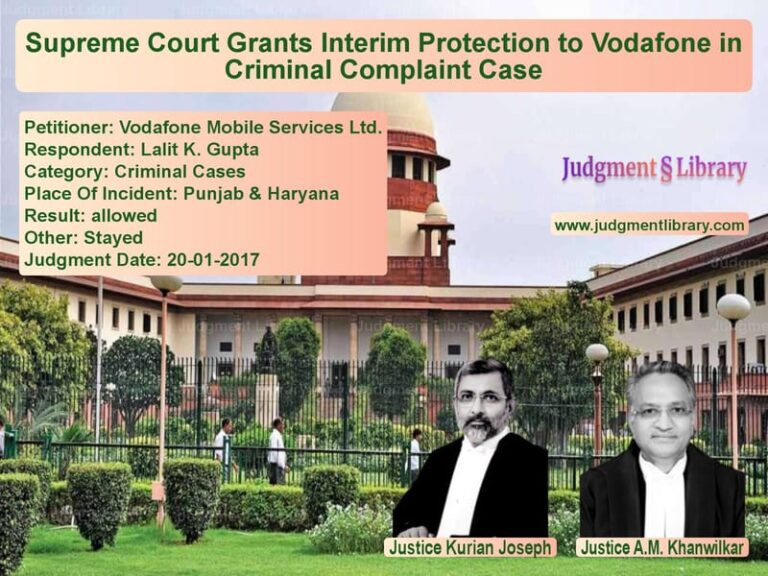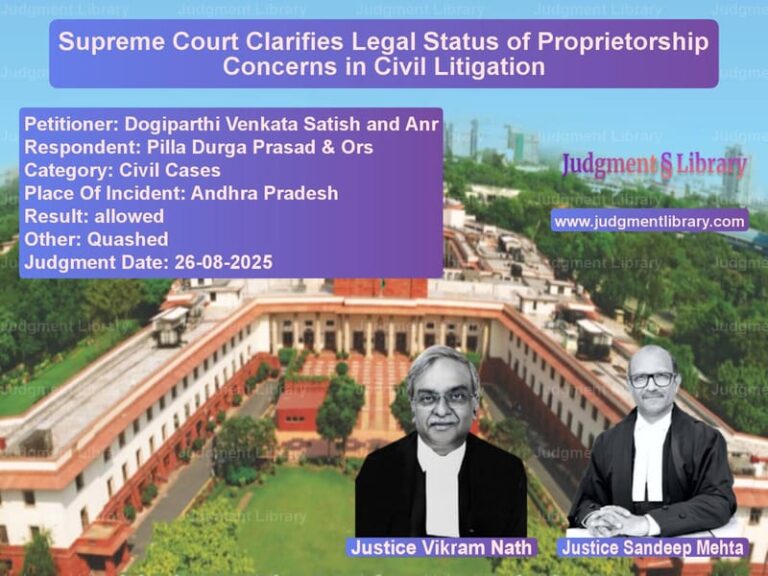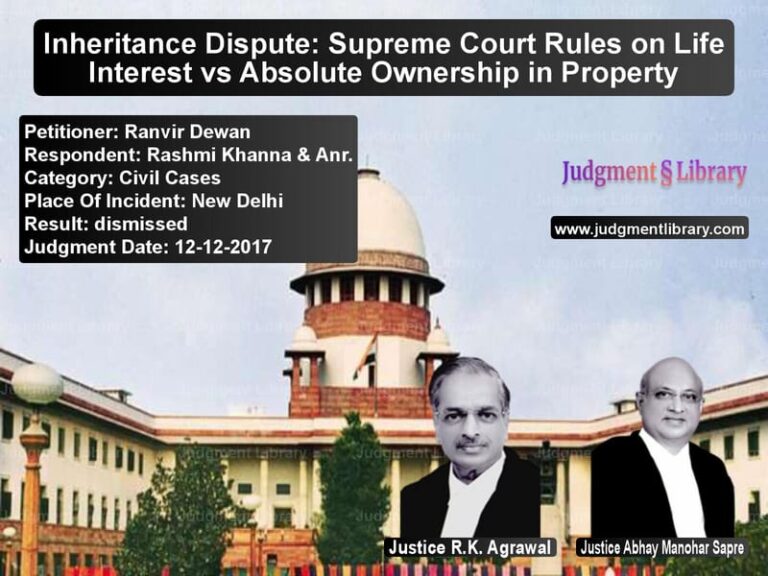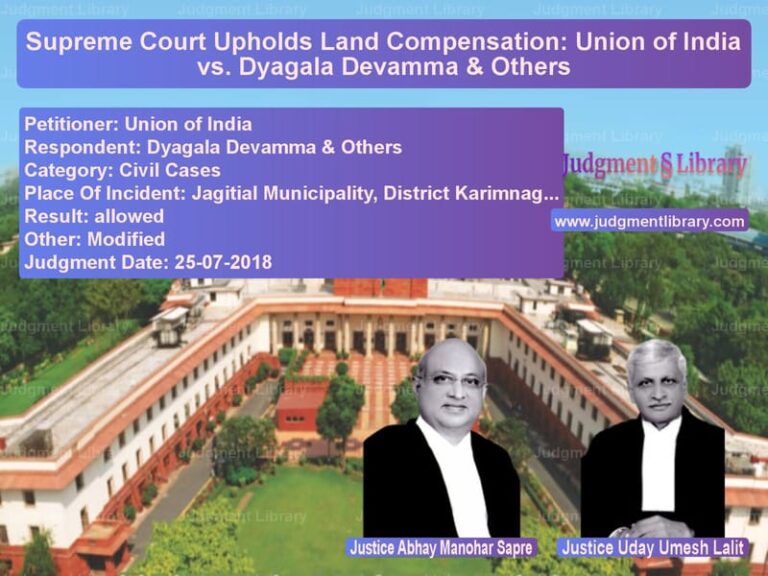NCLT’s Decision Upheld: Supreme Court Dismisses Challenge to Resolution Plan Modification
The Supreme Court, in its judgment dated February 25, 2022, dismissed the appeal filed by Ajay Gupta, a resolution applicant in the insolvency process of B.B. Foods Pvt. Ltd.. The Court upheld the decision of the National Company Law Appellate Tribunal (NCLAT), which had refused to interfere with the National Company Law Tribunal’s (NCLT) order permitting both competing resolution applicants to modify their resolution plans.
Background of the Case
The dispute arose during the Corporate Insolvency Resolution Process (CIRP) of B.B. Foods Pvt. Ltd. Two resolution applicants, including a consortium led by Ajay Gupta, submitted resolution plans. During deliberations in the Committee of Creditors (CoC) meeting on November 2, 2021, both applicants were allowed to rectify certain defects in their plans.
Ajay Gupta later sought to amend his resolution plan to include an upfront payment of Rs. 16.10 crore within 90 days. While the NCLT allowed the amendment, it also permitted the competing resolution applicant to make corresponding modifications, ensuring a level playing field.
Legal Proceedings
- December 13, 2021: The NCLT, Allahabad, allowed Ajay Gupta’s request for plan modification but granted the same opportunity to the other resolution applicant.
- January 13, 2022: The NCLAT upheld the NCLT’s decision, rejecting Gupta’s contention that his plan modifications were merely clarifications.
- February 25, 2022: The Supreme Court dismissed the appeal, upholding the fairness of the NCLT’s order.
Arguments Presented
Petitioner’s (Ajay Gupta’s) Arguments
Ajay Gupta contended:
- His modifications were not substantial changes but merely clarifications in response to CoC discussions.
- The NCLT’s decision unfairly allowed the competing resolution applicant to modify its plan, despite Gupta’s proposal being first.
- The level playing field principle was unfairly applied as his proposal became known to the other applicant.
Respondent’s (Resolution Professional & CoC) Arguments
The CoC and Resolution Professional countered:
- Ajay Gupta’s proposed changes altered key terms of the resolution plan, including reducing the repayment term from 180 days to 90 days.
- Allowing one applicant to modify the plan while denying the same opportunity to the other would be procedurally unfair.
- The approval of the final resolution plan followed due process and was beyond the scope of judicial interference.
Supreme Court’s Observations
On the Nature of the Modification
The Court ruled:
“The modification of the term from 180 days to 90 days cannot be treated as an innocuous clarification. It materially impacts the resolution plan.”
The Court held that Ajay Gupta’s claim that the change was not a modification but a clarification was legally unsustainable.
On Ensuring a Level Playing Field
The Supreme Court supported the NCLT’s approach:
“When one resolution applicant is permitted to modify, fairness demands that the competing applicant be granted the same opportunity.”
The Court ruled that the NCLT acted correctly in allowing both applicants to revise their offers.
On Procedural Fairness
The Court noted:
“If the appellant disclosed the terms of his resolution plan before the Adjudicating Authority, he cannot later claim that his plan became unfairly known to the competing applicant.”
Final Judgment
The Supreme Court ruled:
- The appeal was dismissed.
- The NCLT and NCLAT orders were upheld.
- The approved resolution plan remained valid.
Implications of the Judgment
This ruling has significant implications:
- Fairness in Insolvency Proceedings: It reinforces the principle that all resolution applicants must be given equal opportunities during CIRP.
- Judicial Restraint: The decision underscores that courts will not interfere in CoC decisions unless there is procedural irregularity.
- Clarity on Plan Modifications: It distinguishes between permissible modifications and substantial changes that require CoC approval.
The Supreme Court’s decision upholds procedural fairness and strengthens the insolvency resolution framework.
Petitioner Name: Ajay Gupta.Respondent Name: Pramod Kumar Sharma.Judgment By: Justice Dinesh Maheshwari, Justice Vikram Nath.Place Of Incident: Allahabad.Judgment Date: 25-02-2022.
Don’t miss out on the full details! Download the complete judgment in PDF format below and gain valuable insights instantly!
Download Judgment: ajay-gupta-vs-pramod-kumar-sharma-supreme-court-of-india-judgment-dated-25-02-2022.pdf
Directly Download Judgment: Directly download this Judgment
See all petitions in Bankruptcy and Insolvency
See all petitions in Corporate Governance
See all petitions in Company Law
See all petitions in Judgment by Dinesh Maheshwari
See all petitions in Judgment by Vikram Nath
See all petitions in dismissed
See all petitions in Declared Infructuous
See all petitions in supreme court of India judgments February 2022
See all petitions in 2022 judgments
See all posts in Corporate and Commercial Cases Category
See all allowed petitions in Corporate and Commercial Cases Category
See all Dismissed petitions in Corporate and Commercial Cases Category
See all partially allowed petitions in Corporate and Commercial Cases Category







